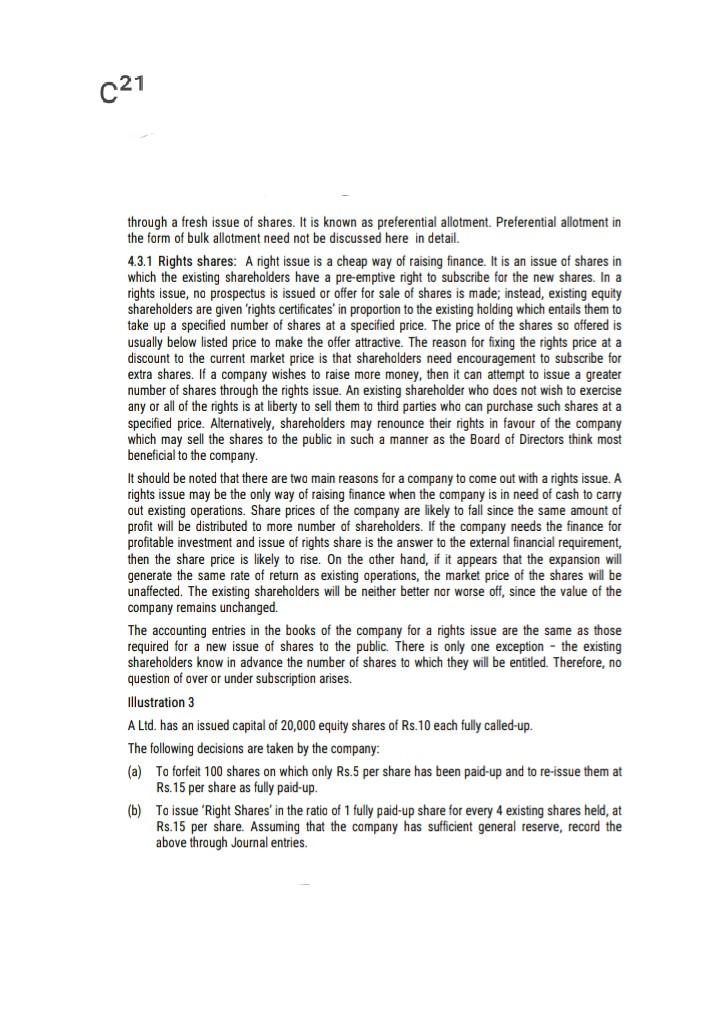Answered step by step
Verified Expert Solution
Question
1 Approved Answer
C21 through a fresh issue of shares. It is known as preferential allotment. Preferential allotment in the form of bulk allotment need not be discussed

C21 through a fresh issue of shares. It is known as preferential allotment. Preferential allotment in the form of bulk allotment need not be discussed here in detail. 4.3.1 Rights shares: A right issue is a cheap way of raising finance. It is an issue of shares in which the existing shareholders have a pre-emptive right to subscribe for the new shares. In a rights issue, no prospectus is issued or offer for sale of shares is made, instead, existing equity shareholders are given 'rights certificates in proportion to the e existing holding which entails them to take up a specified number of shares at a specified price. The price of the shares so offered is usually below listed price to make the offer attractive. The reason for fixing the rights price at a discount to the current market price is that shareholders need encouragement to subscribe for extra shares. If a company wishes to raise more money, then it can attempt to issue a greater number of shares through the rights issue. An existing shareholder who does not wish to exercise any or all of the rights is at liberty to sell them to third parties who can purchase such shares at a specified price. Alternatively, shareholders may renounce their rights in favour of the company which may sell the shares to the public in such a manner as the Board of Directors think most beneficial to the company. It should be noted that there are two main reasons for a company to come out with a rights issue. A rights issue may be the only way of raising finance when the company is in need of cash carry out existing operations. Share prices of the company are likely to fall since the same amount of profit will be distributed to more number of shareholders. If the company needs the finance for profitable investment and issue of rights share is the answer to the external financial requirement, then the share price is likely to rise. On the other hand, if it appears that the expansion will generate the same rate of return as existing operations, the market price of the shares will be unaffected. The existing shareholders will be neither better nor worse off, since the value of the company remains unchanged. The accounting entries in the books of the company for a rights issue are the same as those required for a new issue of shares to the public. There is only one exception - the existing shareholders know in advance the number of shares to which they will be entitled. Therefore, no question of over or under subscription arises. illustration 3 A Ltd. has an issued capital of 20,000 equity shares of Rs.10 each fully called-up. The following decisions are taken by the company: (a) To forfeit 100 shares on which only Rs.5 per share has been paid-up and to re-issue them at Rs. 15 per share as fully paid-up. (b) To issue 'Right Shares' in the ratio of 1 fully paid-up share for every 4 existing shares held at Rs.15 per share. Assuming that the company has sufficient general reserve, record the above through Journal entries
Step by Step Solution
There are 3 Steps involved in it
Step: 1

Get Instant Access to Expert-Tailored Solutions
See step-by-step solutions with expert insights and AI powered tools for academic success
Step: 2

Step: 3

Ace Your Homework with AI
Get the answers you need in no time with our AI-driven, step-by-step assistance
Get Started


